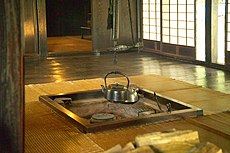Irori: Difference between revisions
Appearance
Content deleted Content added
m Bot: Migrating 6 interwiki links, now provided by Wikidata on d:q1185514 (Report Errors) |
Kenchikuben (talk | contribs) added reference |
||
| Line 1: | Line 1: | ||
{{Unreferenced stub|auto=yes|date=December 2009}} |
|||
[[Image:Japanese Traditional Hearth L4817.jpg|thumb|230px|right|Irori]] |
[[Image:Japanese Traditional Hearth L4817.jpg|thumb|230px|right|Irori]] |
||
'''Irori''' (いろり, 囲炉裏, 居炉裏) are a type of traditional sunken [[hearth]] common in [[Japan]]. Used for heating the home and cooking food, irori are essentially square pits in the floor with a pot hook, or '''jizaikagi''' (自在鉤). These hooks generally were hollow [[bamboo]] tubes containing an iron rod, with an attached lever, often shaped like a fish, that would allow the pot or kettle to be raised or lowered. |
'''Irori''' (いろり, 囲炉裏, 居炉裏) are a type of traditional sunken [[hearth]] common in [[Japan]]. Used for heating the home and cooking food, irori are essentially square pits in the floor with a pot hook, or '''jizaikagi''' (自在鉤). These hooks generally were hollow [[bamboo]] tubes containing an iron rod, with an attached lever, often shaped like a fish, that would allow the pot or kettle to be raised or lowered.<ref name = "fahr, p196">Fahr-Becker (2001), p196</ref> |
||
==Footnotes== |
|||
{{reflist}} |
|||
==References== |
|||
* {{cite book |last1=Fahr-Becker |first1=Gabriele |title=Ryokan - A Japanese Tradition |edition=|year=2001 |origyear=2000 |publisher=Könemann Verlagsgesellschaft mbH |location=Cologne |isbn=3-8290-4829-7 }} |
|||
{{Japanese architectural elements}} |
{{Japanese architectural elements}} |
||
Revision as of 15:36, 10 November 2013

Irori (いろり, 囲炉裏, 居炉裏) are a type of traditional sunken hearth common in Japan. Used for heating the home and cooking food, irori are essentially square pits in the floor with a pot hook, or jizaikagi (自在鉤). These hooks generally were hollow bamboo tubes containing an iron rod, with an attached lever, often shaped like a fish, that would allow the pot or kettle to be raised or lowered.[1]
Footnotes
- ^ Fahr-Becker (2001), p196
References
- Fahr-Becker, Gabriele (2001) [2000]. Ryokan - A Japanese Tradition. Cologne: Könemann Verlagsgesellschaft mbH. ISBN 3-8290-4829-7.

